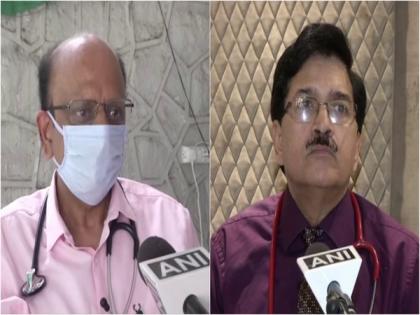Former IMA president, secretary welcome Ordinance to protect health workers
By ANI | Published: April 24, 2020 01:42 AM2020-04-24T01:42:22+5:302020-04-24T01:55:02+5:30
Former Indian Medical Association (IMA) president Dr KK Aggarwal and former secretary Dr Ravi Malik have welcomed the central government's decision to bring in an Ordinance to check violence against health workers, making it a cognisable and non-bailable offence.

Former IMA president, secretary welcome Ordinance to protect health workers
"On Wednesday, we had a meeting with Home Minister Amit Shah and Health Minister Harsh Vardhan. I was also a part of that meeting. Representatives of IMA interacted with the government. The government assured us that we will take care of the security of healthcare professionals, be it doctors, nurses or paramedical staff. Second, they also appreciated the work done by our medical community in the wake of this pandemic," Dr Malik told .
"The government was very clear that the security of doctors and nurses is non-negotiable. They have done certain works on this and they are now planning to do some more things. So, within six hours, the government came out with an Ordinance. This Ordinance is amazing," he added.
President Ram Nath Kovind has approved to promulgate The Epidemic Diseases (Amendment) Ordinance, 2020 which provides stricter punishments for attacks against health workers even as the country battles the coronavirus outbreak.
The Union Cabinet, in its meeting held on Wednesday, approved the promulgation of the Ordinance to amend the Epidemic Diseases Act, 1897 to "protect healthcare service personnel and property including their living or working premises against violence during epidemics."
Dr Malik said that the Ordinance should be applicable throughout the year.
"The only thing is that this ordinance is applicable only during the epidemic. We demand that it should be applicable throughout the year otherwise also because the assault on doctors is not a problem of only the epidemic. It is otherwise also a problem," he said.
"Because of this Ordinance, healthcare workers will feel more protected. They will feel that they are empowered with a law which has both tooth and nail. So, it will be a multipronged thing which is going to protect the doctors and will create a fearless attitude in healthcare workers. These kinds of incidents, if they are still occurring after coming out of the law, these culprits should be booked under the present law and stern action should be taken," he added.
Meanwhile, Dr KK Aggarwal said that the Ordinance is a "right step at the right time." However, he said that "there are some loopholes."
"Government should clarify that during the pandemic and post-pandemic till the surveillance is on, this is applicable in all establishments whether they are treating COVID-19 patient or not. Ideally, they should further amend to make it permanent because the fear of pandemic will always be there... To make it permanent is need of the day," he said.
"The amendment makes acts of violence cognisable and non-bailable offences. Commission or abetment of such acts of violence shall be punished with imprisonment for a term of three months to five years, and with fine of Rs 50,000 to Rs 2 lakh," the Ministry of Health and Family Welfare said in a release on Wednesday.
"In case of causing grievous hurt, imprisonment shall be for a term six months to seven years and with fine of Rs 1 lakh to Rs 5 lakh. In addition, the offender shall also be liable to pay compensation to the victim and twice the fair market value for damage of property," the ministry added.
Offences shall be investigated by an officer of the rank of Inspector within a period of 30 days, and trial has to be completed in one year, unless "extended by the court for reasons to be recorded in writing."
( With inputs from ANI )
Open in app